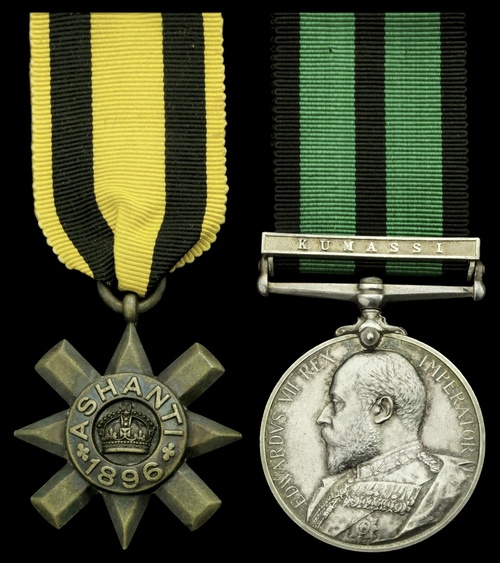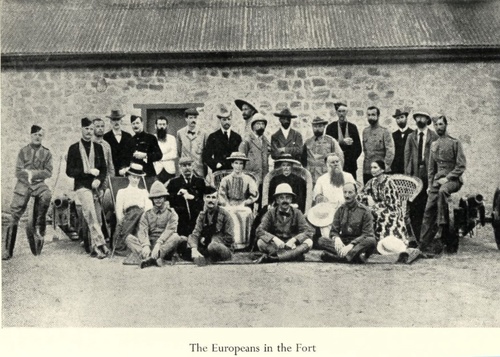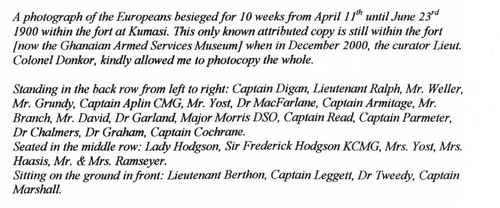Auction: 20002 - Orders, Decorations, Medals & Space Exploration
Lot: 284
An impressive campaign pair awarded to Lieutenant-Colonel F. R. B. Parmeter, East Surrey Regiment and Gold Coast Constabulary
Having been attacked by the enraged Ashanti whilst proceeding on sick leave in early 1900 - this hair-raising contact and outbreak of the rebellion is recorded in his detailed personal account - before he made the Fortress and later became one of the Governor’s party in the break out from Kumassi
Ashanti Star 1896, unnamed as issued; Ashanti 1900, 1 clasp, Kumassi (Captain F. R. B. Parmeter 4th E. Surrey Regt.), good very fine (2)
Francis Robert Bircham Parmeter was born on 24 February 1871 at Brynraber Bala, North Wales and educated at Rossall School. Commissioned 2nd Lieutenant in the 4th Battalion, East Surrey Regiment on 17 May 1889, he was promoted Lieutenant on 28 January 1891 and applied for a position in the Gold Coast Constabulary in 1894. Made an Assistant Inspector on probation in late 1894, he was officially seconded from 8 January 1895, latterly made Captain on 23 October. Despite seeing little action during that year - in fact applying for a transfer to the Barbados Police - Parmeter came to the fore during the 1895-96 operations. He was one of two (the other being Sub-Inspector Donovan) singled out for their part whilst seconded to the Army Service Corps (T.N.A. WO32/7947 refers).
Further service of interest occured during 1899, when Mr Powell went missing around the mines at Obbuasi. Parmeter was sent out into the field to investigate but it appeared the case was a total mystery. He eventually left Kumassi for leave on 27 June but the case required further correspondance with the authorities when he returned home. With the Boer War coming to a head, Parmeter found himself in quandry. His leave was running out but his parent regiment were destined for the Transvaal. As it turned out he had applied to go to the war, but this was blocked by the authorities as it was judged:
'In view of the scarcity of Officers for the Gold Coast Constabulary, I doubt whether we can spare him to the Militia, and would refuse [it]' (T.N.A. CO96/354 refers)
Parmeter had additionally hedged his bets and also applied to the Colonial Office for the vacant position of Travelling Commissioner on the Gold Coast on 1 November 1899:
'I have been in the service of the Gold Coast Constabulary since January 1895 and have travelled in most parts of the Colony either with the late Governor, Travelling Commissioners, or alone, so I have some knowledge of the work. The last work of this character I was imployed in, was reporting on Atabubu, the Neutral Zone and the Kraki ferry over the River Volta.'
Defence of Kumassi
Parmeter left Liverpool aboard the Volta on 22 November. His personal role in the Siege of Kumassi and the start of the rebellion are proferred in the detailed appendix of The Ashanti Campaign of 1900 under the title 'Captain Parmeter's adventures' (p.222-232). Any interested party will enjoy the full text (a copy provided in the Lot) but his was action was the first intimation that the rebellion was taking shape. Having been invalided ill from Gambaga, Parmeter made Kintampo and eventually N'Koranza by 3 Apri. Whilst his carriers had spoken of robbers with guns on the road forward into Ashanti country, this was a common theme and thus the party moved on. Having sent the Headman Shylow to prepare a house for him in Sekedumassi, Parmeter at this point was clearly running out of patience but could hardly have imagined what would follow. Going up the road with his Dresser Lampty, he was fired upon from a distance by some guns. This was not uncommon and as such he carried on. In the meantime his followers began to turn and flee, dropping their loads - it only became clear later that Shylow had been the murdered. Lampty then exclaimed 'Here they come Sir!' as a large party came onto the road, at which point Parmeter rose from his hammock and returned fire with his revolver. The volley in his direction thankfully went high. With his revolver jamming and its barrel eventually bursting, the only escape was to take to the bush with Lampty and his loyal followers. His health and the climate meant he did not make it far and they were forced to take shelter - despite the enraged Ashanti scouring the area and dividing the loot of his baggage. Safety would come at N'Koranze but it meant passing three Ashanti villages, each who would want the pride of killing Parmeter and his band of African brothers. Once sun set they got on the move again, Lampty leading his master who had to lean on his shoulders and rest his head as he was so exhausted. Both their clothes had turned to rags in moving through the dense bush. The following morning - and having been eaten alive by ants as they dozed - the pair retraced their steps and found the almost stagnant watering hole used the previous day. Having drank 'hatfuls' they dashed behind a silk cotton tree as 80 armed Ashanti came to the same drinking hole. They were tracing their quarry from the marks left in the sand by his boots. Seeing an opportunity, Parmeter then left some deep tracks along a dry river bed which merged into a stream that rose to waist-deep. He then gracefully swung up onto a tree that overhung the river, slipped his boots off and went into the bush. Having taken cover, the Ashanti picked up the trail and continued along the trail they had left.
For the remainder of the journey he walked without boots to avoid being tracked, working at night whenever possible. Picking up a few of the followers who flew, the carriers tried to lift Parmeter as he was all but broken by the journey. His feet were cut and swollen and a few of the followers went ahead into the last village before safety. They had to hope they would be granted food, a hammock for Parmeter and passage to N'Koranza country. Entering the village every request was met with the same reply:
'We must ask the Chief.'
This intentional delay gave time for a messenger to slip away to find out if they were to be killed immediately but Lampty knew something was up. At this time he took the call to gamble all and play a superb bluff, announcing to all:
'There are plenty more white men and plenty more clers like myself and it is very foolish of you to go and kill us. We know the message you have received and we have seen your men go out into the bush to shoot us on the road. All right, do so; we are not afraid, my master and I. But you are fools, for remember there are other white men and other clerks, and they will come with soldiers, and who then will get the blame? You in this village, of course. Did those who sent the message dare to do this thing? No, of course not!'
The party were allowed to pass and made N'Koranza - reaching Mr Hansen who gave his account of fleeing the Fort whilst the Governor and his party remained. Parmeter sent the telegram on 6 April to D.C. Rainsford at Kintampo to inform him of the Ashanti rebellion as having begun. All his political skills were required as the Princess of N'Koranza asked for a summit - he pushed the case that her people had always sided with the British and had previously worked against the Ashanti. Captain Benson arrived and made the march to Kintampo with both her blessing and loyalty assured. For the next month there were just four white Officers at the garrison - Benson, Parmeter, Graham and Rainsford. Rumours of traders and Europeans being murdered circled daily but they stuck to it. A fort was built on the guard-room with iron telegraph poles and wires with entaglements. Watches were attempted during the night which usually meant the four ended up being awake the whole twenty four hours. Benson and Rainsford went down with fever but soon after Captain Digan and Dr Riddle arrvied with thirty men from Wa. Having eventually made their way to Kumassi after their epic adventure Parmeter played a key role up to the famous moments of late June. With stores dwindling Cassell's Battles of the 19th Century gives a good account of that breakout:
'And so it came to pass that on the night of the 22nd June 1900, the order was silently circulated that at daybreak on the morrow the Exodus from Kumassi would be attempted.
Nature, hitherto so pitiless, for once was kind. A heavy morning mist hung low and veiled the withdrawal. It was a sad and tragic parting at dawn of day on the 23rd June, in the white, shivering morning mist, the lean, gaunt garrison of Kumassi, with its leaner, gaunter string of carriers, and its leanest, gauntest trail of tottering refugees, crept out of the fort, and silently vanished into the gloom of the great dripping forests. With what poignant feeling did those, who where leaving to seek safety, wave their hands, in what mostmust have feared was a last farewell, to the comrades they were abandoning. Comrades who had fought with them, shoulder to shoulder, in the sore strife of the last ten weeks! To the dauntless three, and their hundred trusty black followers, who, in this hour of appalling peril, rose to the wonderful level of the white man's heroism.
The evacuating force consisted of the Governor and Lady Hodgson; Major Morris, who was in command; Messrs. Marshall, Digan, Aplin, Armitage, Parmeter, Leggett, Berthon, Cochrane and Reade, all officers of the various military forces; Drs Garland, Chalmers, Tweedy and Graham, of the Medical Service; two mining engineers, Messrs. Baird and Grundy, of the Ashanti Company; a telgraph clerk; and the Basel Missionaries, viz. Mr and Mrs Ramseyer, Mr and Mrs Josy, Mrs Hoasis, and Mr Weller. Amongst the natives were the loyal Kings of Akwanta and N'Souta, with their followers. The column on the line of march extended over a length of two miles - and "like a wounded snake dragged its slow length along". In the centre, surrounded by a special guard, were the four ladies, whose admirable behaviour was worthy of all that is best and bravest.'
They left behind them a small garrison of two officers and and a medical officer with about a hundred men, who were relieved by the relief force under Brigadier-General Sir J. Willcocks on the 15th July. Willcocks took away the sick and wounded and again left behind a small garrison. This was in turn relieved by the force under Colonel A. P. Burroughs on the 5th August. The Queen of N'Koranza latterly was awarded the Gold Coast Badge and Certificate of Honour for her loyalty in the show. Returned home, Parmeter was suffering from all that he had been through in the preceeding months. Writing to the Colonial Office for his medical claim on 10 December 1900 (T.N.A. CO196/373 refers) he gives more detail:
'I should have sent them in before, but unfortunately I have been so very seedy, they had to stand over. I do not seem to be able to shake off at all this time the effects of the bad time we had. Yesterday morning I was up to 105 degrees and am very much affraid that I shall have to give up all hopes of going out again. It will be a very great disappointment to me as I am fond of the life and the opportunities [that] present themselves on the Coast which one does not get anywhere else. I had so hoped to get out there to have had a claim for a better position in a healthier climate.
Everything, however, went wrong as there had been any fighting on the first Ashanti expedition, and should have been recommended for a commission in the Army Service Corps by Col Ward. Then Sir William Maxwell's death followed. He had been pleased with my work in connection with the Katarwery Fetish and Neutral Zone, but recognised that I could not stand the climate and he got home, he would have tried to get me something else.
The last tour, although the N'Koranza were prevented from retiring and Major Morris acting on my telegram, arrived in time to save the situation there. Governor Hodgson did not think to report of the affair need go into the Colonial Office. Major Read however, who's advice I aske privately on the subject, very kindly said it ought to go in an he would show it to you.
I trust you will forgive me for going into all this, but Lord Selbourne, the other day when I saw him said he would see you about me and that I ought to see you myself. This I unfortunately cannot do at present owing to my wretched state of health.'
Parmeter was invalided from the Service in 1901. He was recommissioned into the East Surrey Regiment on 12 September 1914 and was promoted Acting Lieutenant-Colonel in Command of the 363rd Labour Centre during 1918. Serving in Egypt at Sidi Bishr as Commandant of Alien Internment & Prisoners of War Camps from 28 December 1918-13 June 1919, he was admitted to Ras-el-Tin Hospital, Alexandria on 14 May 1919. Returned to England, he remained in hospital at the 3rd General Hospital, 22 June-5 September, he died in Milbank Hospital on 16 October 1919. His widow claimed his will; sold together with copied service record, detailed research and a named photograph of the original Defenders of Kumassi - this last believed to be published with attribution for the first occasion.
Subject to 20% VAT on Buyer’s Premium. For more information please view Terms and Conditions for Buyers.
Sold for
£2,200
Starting price
£600









